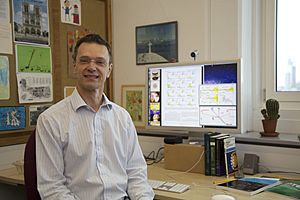Terry Wyatt facts for kids
Quick facts for kids
Terry Wyatt
|
|
|---|---|

Terry Wyatt in his office in 2013
|
|
| Born |
Terence Richard Wyatt
29 June 1957 |
| Education | Queen Elizabeth's Grammar School, Tamworth |
| Alma mater |
|
| Known for | DØ experiment |
| Awards | Chadwick Medal (2011) |
| Scientific career | |
| Fields |
|
| Institutions | |
| Thesis | A study of the production of b quarks in e+e- annihilation at high energies (1983) |
| Doctoral advisor | Robin Devenish |
Terence Richard Wyatt (born 29 June 1957) is a top scientist from the UK. He is a Professor at the University of Manchester. Professor Wyatt studies tiny particles, which are the building blocks of everything around us. He helps us understand how the universe works at its most basic level.
Contents
Learning and School
Terry Wyatt went to Queen Elizabeth's Grammar School when he was younger. Later, he studied at two famous universities. He earned his first degree, a Bachelor of Science (BSc), from Imperial College London. Then, he went to the University of Oxford and earned a Doctor of Philosophy (DPhil) degree in 1983. A DPhil is a very high degree that shows you are an expert in your field.
His Work in Physics
Professor Wyatt is a particle physicist. This means he studies the smallest pieces of matter and the forces that hold them together.
Big Experiments
He works on huge experiments that use powerful machines called particle colliders. These machines smash tiny particles together at very high speeds. Scientists then study what happens to learn more about the universe.
- DØ Experiment: He worked on the DØ experiment at Fermilab in the USA. This experiment used a machine called the Tevatron. The Tevatron smashed protons and antiprotons together.
- ATLAS Experiment: He also works on the ATLAS experiment at CERN in Switzerland. CERN has the Large Hadron Collider, which is the world's largest and most powerful particle accelerator. It smashes protons together.
Searching for Answers
Professor Wyatt's research helps confirm the Standard Model of particle physics. This model is like a rulebook that describes how fundamental particles and forces interact. He looks for new clues that could help scientists understand even more about the universe.
Leading the Way
In 2014, Professor Wyatt was considered for a very important job: the Director General of CERN. This shows how respected he is in the world of science.
Awards and Honors
Professor Wyatt has received several important awards for his scientific work.
Royal Society Fellow
In 2013, he became a Fellow of the Royal Society (FRS). This is a very special honor in the UK. It means he is recognized as one of the best scientists in the country.
- His award recognized his important work in checking the Standard Model.
- He is known for his skill in using detectors and understanding how particles interact.
- His work helped make very precise measurements of heavy quarks and electroweak bosons.
- He led the D0 experiment at Fermilab, showing his leadership in science.
Chadwick Medal
In 2011, he was given the James Chadwick Medal and Prize by the Institute of Physics. This medal is named after James Chadwick, who discovered the neutron. It is another sign of his important contributions to physics.
 | Charles R. Drew |
 | Benjamin Banneker |
 | Jane C. Wright |
 | Roger Arliner Young |

